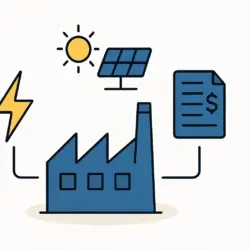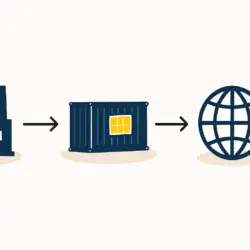DHL Express has unveiled its new Gateway and Service Centre in Rayong, Thailand, marking a significant step forward for sustainable logistics in Southeast Asia. This facility stands out as the first fully solar-powered logistics hub in the country, strategically positioned to support the burgeoning e-commerce and industrial sectors within the vital Eastern Economic Corridor (EEC).
Facility Overview of the DHL Thailand solar hub
The new Rayong Gateway and Service Centre is a pioneering example of green logistics infrastructure. It is equipped with a powerful 1,100 kWp solar rooftop system designed to generate 1.5 million kWh of electricity annually. The successful implementation of such a system relies on a sophisticated solar panel manufacturing process, which transforms raw materials into high-efficiency energy-producing modules.
Located in Rayong, the hub is built to meet the escalating demands of the region. The facility features a 3,500-square-meter warehouse and a 1,400-square-meter sorting area, boasting the capacity to handle 3,000 pieces per hour. This large-scale solar integration is expected to reduce carbon dioxide emissions by an impressive 1,000 tonnes per year compared to facilities running on traditional power grids. Looking ahead, DHL is also exploring further enhancements, such as solar battery systems, to maximize the facility’s energy independence and sustainability.
Rayong Gateway to Boost Thailand’s Exports with DHL Thailand solar hub
The Rayong Gateway and Service Centre is poised to play a crucial role in bolstering Thailand’s export growth, which is projected to reach 4% in 2024. By enhancing the efficiency of logistics services, the facility empowers local businesses, making it easier for them to access global markets. This is particularly critical as Thailand continues to leverage its strategic location and robust, export-oriented economy. The country is a key trade partner for its neighbors, a fact highlighted in reports on Myanmar’s solar panel manufacturing and export destinations.
By providing strategic advantages in logistics, the facility helps local enterprises compete more effectively on the world stage. The combination of its prime location and advanced infrastructure is set to drive export growth, directly supporting Thailand’s broader economic development goals. In doing so, the Rayong Gateway sets a new benchmark for sustainable and efficient logistics throughout the region.
Commitment to Sustainability at the DHL Thailand solar hub
This new facility is a cornerstone of DHL’s wider strategy to minimize its carbon footprint and champion sustainable practices across the logistics industry. It directly aligns with the company’s global commitment to achieving net-zero emissions logistics by 2050. The Rayong Gateway serves as a tangible model for future hubs, demonstrating how renewable energy can be seamlessly integrated into large-scale operations.
This project is part of a larger trend across Asia, with significant investments in renewable energy seen in Malaysia’s solar news and ambitious goals for Sarawak to become the “Battery of ASEAN”. A key benefit for DHL’s clients is the ability to achieve measurable carbon reductions in their supply chains without having to purchase renewable energy certificates (RECs). This initiative showcases how renewable energy can power major logistics operations while significantly reducing environmental impact.
DHL’s Investment in Thailand for the DHL Thailand solar hub
DHL Express has committed THB 2 billion (approximately $63 million) to the expansion of its operations in Thailand, a figure that includes the development of the Rayong Gateway and Service Centre. This substantial investment underscores the company’s confidence in Thailand’s economic trajectory and its dedication to enhancing the nation’s logistics infrastructure. The decision was also influenced by the Thai government’s strong renewable energy policies, which create a favorable environment for green investments.
The Rayong Gateway is expected to become a pivotal logistics hub, streamlining the flow of goods between Thailand and international markets. This development will not only benefit local businesses but also contribute significantly to the growth of the EEC, a cornerstone of Thailand’s economic strategy. This project reflects a broader regional push for clean energy, similar to efforts to boost Laos’ solar power capacity.
By integrating cutting-edge solar technology and strategic investment, DHL is not just building a warehouse; it’s paving the way for a more sustainable and prosperous future for trade in Thailand and beyond. To learn more about the fundamentals of creating such impactful projects, explore our free e-course on solar manufacturing.



